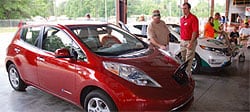Is America ready for the electric car?

Much buzz surrounded the 2011 release of electric vehicles by two prominent automakers. The Chevrolet Volt and the Nissan Leaf were hailed as “the future is now” cars that would usher in a new era of energy independence and technological innovation for the United States.
One question I hear a lot about electric cars is their effect on the environment. Because you plug them in just like any other appliance—creating more work for power plants—will we really prevent carbon emissions? According to the Electric Power Research Institute, a Palo Alto, Calif.- based consortium, the short answer is yes. Despite the extra load, various airborne emissions will decline with the onset of electric cars. Each region of the country will see reductions in greenhouse gas emissions over several decades, thanks in part to technologies that decrease carbon dioxide emissions from power plants. In addition, electric cars could actually help electric cooperatives if consumers plug them in at night—that helps the system run more efficiently because power costs and demand are at their lowest.

However, the costs may still be prohibitive for most Americans. The Cooperative Research Network estimates that payback in terms of gasoline savings would take about a decade (depending on your driving habits). And if you want the car to charge up quickly (instead of the usual four to eight hours or so with a regular 110‑V outlet), you’ll have to install a higher-voltage outlet at your home. Besides the cost of having the 220‑V outlet installed—which one cooperative wholesale power provider estimates to be about $2,000—your home’s wiring may need to be updated to accommodate it. The costs add up.
Whether an electric car suits you also depends on your lifestyle, how much you drive, and whether you want your vehicle to have fancy amenities that use more electricity.
Cities across the country are attempting to do their part—electric vehicle charging stations are springing up at various locations here and there. But barriers, including cost, limited driving range on a charge, and easy access to chargers, still inhibit widespread use.
Your cooperative is doing its part, too. We’ve installed a Level 2 charging station at our York office which is open to the public and free of charge to use. YEC is also prepared to offer appropriate electric rates as an incentive to members who charge their cars at their homes during off-peak hours. Such an effort would help lower power cost for the entire membership.
![]()
Paul Basha
President and Chief Executive Officer
